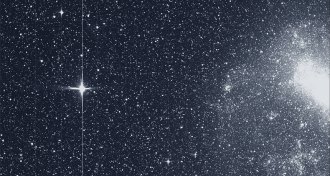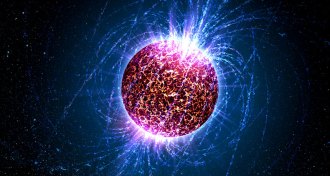Astronomy
-
 Astronomy
AstronomyPaula Jofré makes stellar connections
Astrophysicist Paula Jofré is a galactic archaeologist, mapping out generations of stars.
-
 Astronomy
AstronomyAstronomers may have spotted the birth of a neutron star
Scientists say they’ve witnessed a type of neutron star called a pulsar being born in the wake of a massive supernova for the first time.
-
 Astronomy
AstronomyJapan has launched a miniature space elevator
The Japanese space agency just launched a prototype space elevator to the International Space Station to test motion along a taut cable in space.
-
 Astronomy
AstronomyThe TESS space telescope has spotted its first exoplanet
TESS’s first exoplanet is twice Earth’s size and may have lots of water.
-
 Physics
PhysicsNuclear pasta in neutron stars may be the strongest material in the universe
Simulations suggest that the theoretical substance known as nuclear pasta is 10 billion times as strong as steel.
-
 Astronomy
AstronomyJocelyn Bell Burnell wins big physics prize for 1967 pulsar discovery
Astrophysicist Jocelyn Bell Burnell speaks about winning the Breakthrough Prize, impostor syndrome and giving back.
-
 Astronomy
AstronomyReaders’ interest piqued by Parker Solar Probe, general relativity and more
Readers had questions about NASA's Parker Solar Probe, Einstein's general relativity theory and underwater cables used as earthquake sensors.
-
 Astronomy
AstronomyTo boldly go where no robot explorer has gone before
Editor in Chief Nancy Shute discusses the importance of robotic space missions for scientific research.
By Nancy Shute -
 Astronomy
Astronomy‘Accessory to War’ probes the uneasy alliance between space science and the military
Neil deGrasse Tyson and Avis Lang’s ‘Accessory to War’ grapples with the millennia-old partnership between space science and warfare.
-
 Astronomy
AstronomyNew images reveal how an ancient monster galaxy fueled furious star formation
Scientists were able to see the abundance of star-forming gas and dust in a giant galaxy from when the universe was less than 2 billion years old.
-
 Astronomy
AstronomyStrange gamma rays from the sun may help decipher its magnetic fields
The sun spits out more and weirder gamma rays than anyone expected, which could give a new view of the sun’s magnetic fields.
-
 Astronomy
AstronomyFive things we learned from last year’s Great American Eclipse
A year after the total solar eclipse of 2017, scientists are still pondering the mysteries of the sun.